Contents
1 Aim
The pay progression policy and procedure has been developed in accordance with the agenda for change terms and conditions of service. The arrangements were introduced to ensure that in a patient centred health care system, employees are supported to develop and utilise the skills and behaviours required in a modern NHS organisation.
The intention of this policy is to assist employees and managers to understand the requirements needed to progress through the agenda for change pay scale.
2 Scope
This policy applies to all employees who are directly employed on agenda for change terms and conditions by the trust and for whom the trust has legal responsibility.
This procedure applies to all new starters to the trust or those promoted to a new role, and for any posts which are rebranded in accordance with job evaluation. Promoted for the purpose of this procedure means moving to a higher band. Where an issue is raised involving a seconded employee from another organisation who is employed on agenda for change terms and conditions of service, human resources will liaise with the human resources department of the employing organisation involved, agreeing a way forward in accordance with the policy framework of each organisation. This does not cover any posts which are rebranded or evaluated in accordance with a change management process, moving to a lower banded post or a post in the same band. In these cases the pay step date remains unchanged.
A pay step date is also referred to on payslips as an incremental date.
3 Links to overarching policy
The overarching policy is the appointment of staff policy.
4 Procedure or implementation
4.1 Line managers
It is the responsibility of the line manager to:
- implement this policy and procedure as appropriate, in accordance with the guiding principles outlined, to enable employees to develop and utilise their skills
- communicate the competencies and behaviours expected in performing those roles
- conduct an objective performance development review (PDR), at least on an annual basis, of the employee’s work against the required standards, including an assessment of the employee’s achievement of any personal or organisational objectives, values and behaviours
- if the pay step date is different to the PDR date the manager must conduct a pay step review meeting and input details directly onto ESR. If the pay step is deferred, this must be confirmed in writing to the employee, as detailed in section 4.6
- ensure employees understand what evidence they will need to demonstrate they have met the required standards for pay progression
- complete any documentation as required in a timely manner, including recording the date of the PDR and notification via ESR
- record the pay progression meeting and whether this has been agreed or declined on ESR in a timely manner to ensure pay services have the information required
- attend PDR workshops arranged via learning and development
4.2 Employees
It is the responsibility of each employee to:
- actively participate in the performance management processes outlined in this policy and procedure
- complete an annual PDR each year, regardless of whether a pay-step is due and to agree personal and organisational objectives with their line manager
- attain and maintain continued professional development, academic and practical based qualifications and where necessary undertake appropriate supervision that is relevant to their role, for example, clinical or managerial supervision, as required in order to perform their duties as identified in their job description. Further guidance is available from the Learning and Development team
- if the pay step date is different to the employees PDR date, employees must participate in the pay step review meeting
- take personal responsibility for proactively maintaining expected levels of performance and notify their line manager of any issues which may impact on continued performance
- demonstrate that they have met the required standards for pay progression
- maintain 100% compliance with their statutory and mandatory training requirements, see section 4.4 for further clarity
- take all reasonable steps possible to ensure personal health, safety and wellbeing
- be aware of their pay step date
- attend PDR Workshops arranged via learning and development
4.3 People and organisational development directorate
It is the responsibility of the people and organisational development directorate to:
- supply reports to line managers highlighting the pay step dates of employees
- support line managers to maintain correct information regarding pay step dates and any deferments
- provide and facilitate PDR workshops
- advise line managers and supervisors on the application of this policy and the linkages to the performance capability management policy and procedure and the disciplinary policy as appropriate
- advise line managers and supervisors on the application of this policy and the links to agenda for change terms and conditions
- assist in the identification of relevant training and development opportunities
- assist with the development of performance action plans
- assist managers in utilising the tools available within other policies and procedures to support employees at work in accordance with good practice and any associated employment legislation
- link with staff side where any common problems arise in order that working in partnership provides the best results
4.4. Standards required for pay progression
Employees will progress to their next pay-step point in their pay band where they demonstrate the following requirements have been met:
- the PDR process has been completed within the last 12 months and the outcome is in line with the trusts standards and values. The PDR must also be recorded on the ESR
- no formal capability (means that the employee has not been placed on formal performance monitoring as per the management of performance (capability) policy and procedure) process is in place
- there is no formal disciplinary sanction live on the employee’s record. This only applies to sanctions issued in accordance with the trust’s disciplinary policy (sickness absence cautions are excluded)
- statutory and or mandatory training has been completed
- for line managers only, PDR’s have been completed for all of their employees
Where factors beyond the employees control have prevented compliance with any of the requirements detailed above, for example, training being cancelled, this should not prevent them from progressing. Employees should bring such factors to the attention of their line manager as soon as possible (not waiting until the pay-step review) so that these can be addressed and remedied, this would normally be through supervision.
Although employees must have successfully completed the PDR process by their pay step date in order to move to their next pay-step point, the date of the PDR is not necessarily linked to this.
4.5 The pay-step process
It is the employee’s responsibility to know when their pay step date is. This is documented on their electronic pay slip. Line managers will also receive notification before an employees next pay step process. Whilst employees will work through the pay-step each year, they may not receive a pay increase yearly. For details on the pay bands please refer to the agenda for change pay scales.
Employees should ensure they have a PDR date arranged with their manager at least one month before their pay-step is due. This will allow the manager enough time to notify payroll via the ESR system whether the pay step has been awarded or not.
As part of the PDR review process, the employee should provide evidence that they are 100% compliant with their statutory and mandatory training requirements as determined by the trust, or have evidence that they tried to access training.
The awarding of pay-step points isn’t automatic on the ESR payroll system line managers are responsible for completing the submission on ESR to activate or delay the pay step point for their employees as appropriate and this will notify payroll in accordance with the agreed payroll cut off timescales.
4.6 Failure to meet the standards to progress
Employees will not be eligible for pay-step progression if they fail to meet the standards as defined in section 4.4.
It is expected that employees will achieve the required standards at the point of their pay-step date. It is also expected that the employee and their line manager should be aware of any problems in reaching the required standards before the pay-step date. This will allow time for issues to be raised and possible solutions found.
The deferment of pay-step progression linked to conduct or capability can only take place if the conduct or capability issues are being formally managed in accordance with trust policy. Please refer to the human resources department for guidance in respect of these matters.
In situations where standards have not been met as per section 4.4, and there are no mitigating factors sufficient to justify this, it is expected that an individual’s pay-step will be delayed, subject to arrangements detailed below.
If the decision is taken to defer pay-step progression, the line manager will need to update ESR to delay the pay step point which also includes the reasons for the deferment. The line manager is also responsible for confirming this in writing to the employee clearly detailing why the pay-step point has not been agreed. The line manager should also discuss and agree a plan with the employee for any remedial action needed to ensure that the required standards are met; including a timescale, and how any training and support needs will be met. The employee must take all necessary steps to meet the requirements as soon as possible and the line manager must provide the necessary support.
A further pay-step review meeting should be arranged at an agreed date to review progress and, where satisfactory, initiate the opening of the pay-step. The employee should progress to the next pay-step effective from the date that the relevant requirements have been met. Their pay step-date for future years will remain unchanged in essence the pay step is delayed for the year in which they did not demonstrate compliance with the standards (for example, pay step was 22 July and was delayed until 1 October, but for the following year the pay step date is the 22 July).
The manager will advise the employee of their right to seek a review of any decision where the required level of performance is deemed not to have been met. The review will be to the next most senior manager and the review should be held within one month of the request being made. If the review is upheld, the pay step should be applied backdated to the pay-step date. There is no further right to appeal a decision under this policy.
4.7 Pay step delayed due to a live disciplinary sanction or outcome
Where a pay-step is delayed due to a live disciplinary sanction, the line manager should initiate a pay-step review meeting before the expiry of the sanction. This should be used to confirm that all other requirements have been met and to ensure that the employee progresses to the next pay-step, effective the day after the sanction expires. The pay-step date will remain unchanged from their original pay-step date.
A disciplinary sanction cannot be applied retrospectively to delay a pay-step if it comes into effect after the pay-step date.
4.8 Employees absent from work when their pay step is due
If an employee is absent from work for authorised reasons, such as sickness absence or family leave, when a pay-step is due, the principle of equal and fair treatment should be followed so that no detriment is suffered due to the authorised absence.
In the case of planned long-term paid absence such as maternity, adoption and shared parental leave the pay-step review can be conducted early if appropriate, allowing the pay-step to be applied on their pay-step date in their absence. If the review cannot be conducted prior to the pay step date, the pay step date should be automatically applied in the employee’s absence.
If an individual is on long-term paid absence and a pay-step review cannot be conducted prior to the pay-step date, the pay-step point should be applied in the individual’s absence, subject to the following, if an employee is absent from work for authorised reasons when a pay-step is due, the principle of equal and fair treatment should be followed so that no detriment is suffered due to the authorised absence.
If there was a live disciplinary sanction or outcome in place at the point the individual went on leave, the pay-step point should be applied in their absence if appropriate, effective the day after the sanction expires.
If there was an active formal capability process underway at the point they went on leave, the pay-step point can be delayed. The improvement process should be resumed immediately upon their return. On satisfactory completion, the period of their absence should be set aside and the pay-step point backdated to an agreed date as if they had completed the improvement process without being absent.
In the event of suspension from work on full pay, for example in the event of an investigation, the pay-step review should be completed based on performance up to the point of suspension in order to ensure that suspension remains a neutral act.
Where a colleague is on an agreed period of unpaid leave, such as a career break, their pay step will be deferred for the period they were absent. The manager must enter the deferral into ESR and write to the individual confirming this agreement.
4.9 Retire and return
If the employee returns to the same job and or same band, then any previous pay progression date, providing within 12 months, may be carried forward. The manager should confirm this to the Workforce team on commencement. If the return is to a different band, then the employee should be treated as new starter to the trust.
5 Equality impact assessment screening
To access the equality impact assessment for this policy, please see the overarching equality impact assessment.
6 Appendices
6.1 Appendix A Pay progression checklist
6.2 Appendix B How to complete and pay progression appraisal
Pay step points (increments) in ESR have automatically been stopped. The manager or ESR administrator will need to take action to open up the next pay step, once the employee has demonstrated that they should progress to the next pay step. It is important to note that the pay progression appraisal is actioned in line with payroll deadlines ideally the month prior to the pay step date to ensure the staff member receives their increment on the specified date. At the very latest the first of the month is the deadline to which you require the pay step to be paid.
From manager self service follow guidance below.
Select appraisals and reviews.

You will now see the appraisals and reviews screen.
Click Go button to create.

You will see a list of the staff in your hierarchy. Click on the action button next to the relevant person.

You will then be taken to the setup details page where you will populate the fields.
In the review type field choose pay progression meeting. You will then need to enter the start or end dates, the period start and end dates should refer to the previous year in which progression is dependent on. For example if the pay step is on 1 May 2021 the period start date will be 1 May 2020 and the period end date will be 30 April 2021.
In template select pay progression meeting. Once you have entered the setup details. Click on add details.

A template for the pay progression appraisal is displayed, the questionnaire is optional, below is where the overall rating should be entered.
Click the dropdown menu next to the overall rating field.
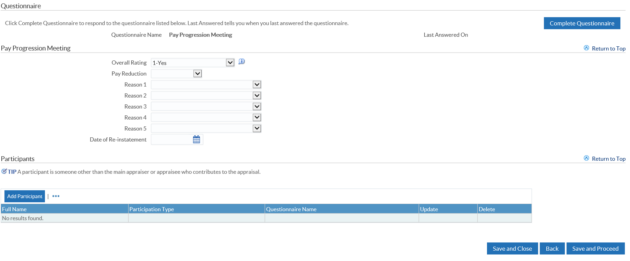
The following options are available:
- yes, the appraisee should progress onto the next pay point.
- no, the appraisee should not progress onto the next pay point, if no has been selected, you must add in a reason in the reason 1 field, you can add more reasons if required. No further progression will be possible without intervention
- yes following initial deferral, this should be used when the employee did not initially pass the criteria, but are reviewed at a later date and at that point are able to progress, when this outcome is recorded, the date of re-instatement should be populated, so that pay services can make the changes from the date specified
At this present time, do not use the pay reduction field, it is for reporting purposes only and does not impact pay for lower bands. Any changes to pay would need to be done manually via pay services.
Click save and proceed button to continue, where the information is then displayed for review, click submit to complete the appraisal.
The pay progression will now be recorded under the appraisals and reviews area within manager self service. Select completed to view the detail. If you have any queries regarding the above please email rdash.workforcesystems@nhs.net.
6.3 Appendix C How to run a pay progression report
Select manager self service.
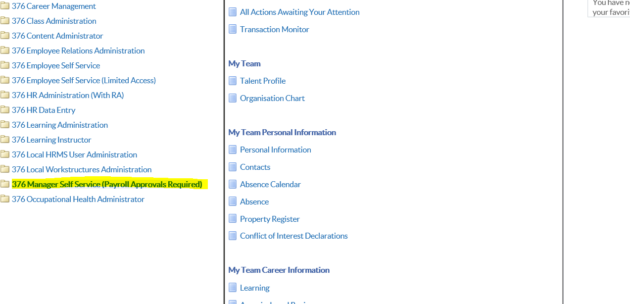 Select business intelligence.
Select business intelligence.
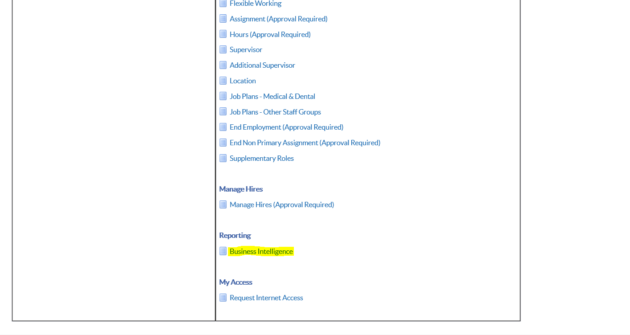 From the dashboard drop down menu select staff requirements dashboard.
From the dashboard drop down menu select staff requirements dashboard.
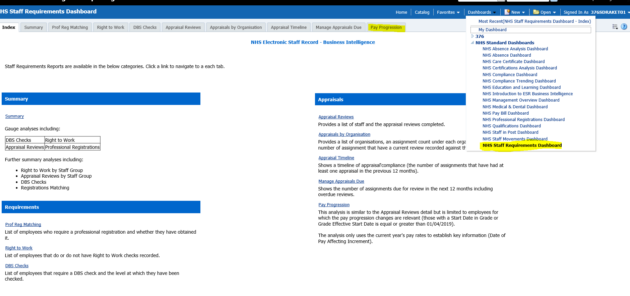
- Once this has loaded select the pay progression tab.
- Change the primary assignment drop down to Y.
- From the review type drop down de-select everything except pay progression meeting.
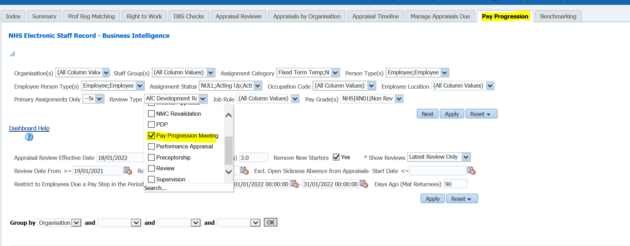
The report will automatically run for today’s date for all the staff that sit under you on the hierarchy. You can alter the time period you are looking at by using the highlighted filters and clicking apply.
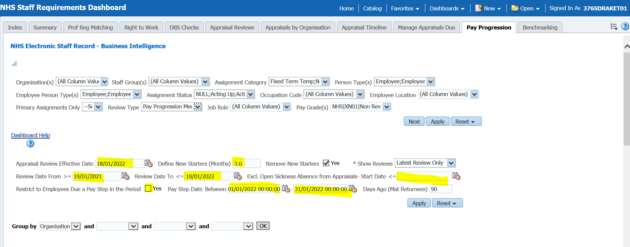
The highlighted filter box defaults to the latest reviews, this means that the report will only show the last review entered and is best used to see who is in date, should you wish to see all historical reviews change to all reviews and click apply.
 At the bottom of the report click export and export onto an Excel document.
At the bottom of the report click export and export onto an Excel document.
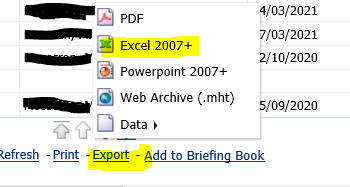
You will then produce the following report which you can filter to your requirements. It will show you your staff’s pay step date along with information about their PDR.
Document control
- Version: 3.1.
- Unique reference number: 484.
- Approved by: Corporate policy approval group.
- Date approved: 8 January 2024.
- Name of originator or author: Head of HR.
- Name of responsible individual: Executive director of people and organisational development.
- Date issued: 10 January 2024.
- Review date: 30 November 2026.
- Target audience: All employees of the trust on agenda for change terms and conditions.
Page last reviewed: October 01, 2024
Next review due: October 01, 2025
Problem with this page?
Please tell us about any problems you have found with this web page.
Report a problem